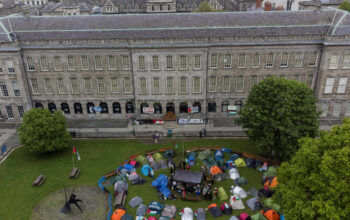
The poet Jenny Xie was exploring the library stacks at the Shanghai campus of N.Y.U., where she was on a fellowship, when a book with a bright red cover caught her eye. In it, she found hundreds of photos of China’s Cultural Revolution.
The images, taken by Li Zhensheng during the dramatic, often violent period of upheaval that gripped China between 1966 and 1976, had been clandestinely preserved until their U.S. publication. Xie devoured the book in one sitting.
Born in Anhui Province, in eastern China, she had moved to the United States to join her parents when she was around 4 years old. The photographs, she said, provided a window into a past shared by generations of Chinese people, including many in her family, and of which she’d seen little visual documentation.
“Suddenly, there is this opening into the past of people I love,” Xie said recently in a garden in Greenwich Village. The photography, she said, “made me think about how deeply strange it was that I have no visual understanding of what so many people in my family lived through.”
The connection she felt with the images reverberated. Xie is a sight-oriented poet. Her debut collection, titled “Eye Level,” won the 2017 Walt Whitman Award and is a feast of scenery: Phnom Penh’s rain-slicked tin roofs, Corfu’s white sailboats lining up like “grains of rice.” It is also preoccupied with the ethics of seeing: a viewfinder “slices the horizon,” a camera “neuters the present” and to bestow one’s gaze is to spend “a soft currency.”
Not long after Xie returned to New York, the pandemic started. Cloistered in her apartment, she returned to Li’s photos often — her own copy of the book became a sort of a portal, she said, connecting the past to the present.
Looking at scenes in which people considered “class enemies” were humiliated and sometimes tortured in front of an audience, known as “struggle sessions,” she’d focus on specific people in the crowd and wonder what had happened to them. Over time, this obsession, along with snippets of her 2019 stay in China and other memories, became fodder for a new collection, “The Rupture Tense,” to be released by Graywolf on Tuesday and already on the longlist for the National Book Award for poetry.
In the book, the poet not only peeks at her family’s past and their country’s history, but also explores the subversive power to be found in examining what has been concealed or overlooked: Li’s long-hidden archive, the older generations’ silence about the past, and the unexamined trauma that goes on shaping how family members relate to one another.
Nearly half a century after the end of the Cultural Revolution, discussion of the period is still largely muffled in public and private spaces in China. Overseas, however, the works of documentarians and novelists, such as Yang Jisheng (who, like Li, was a state news reporter) and Ma Jian, preserve the records and explore the legacy of the era.
“The Cultural Revolution was like a surreal nightmare. It’s a wake-up call today to read Jenny Xie,” the poet and novelist Qiu Xiaolong, who was a teenager in Shanghai during the Cultural Revolution, wrote in an email. “In poetics, she chooses a uniquely working form, controlled language, to mold these inhuman experiences into an organic whole.”
Xie is not the only one who stares into this abyss, but her processing of the experience is particularly evocative. Xie’s lines have an unmooring effect: She slyly dissects images and concepts, rearranging the landmarks of the mind. Tracy K. Smith, who taught Xie more than a decade ago, appreciates her deftness.
“It is a marvelous and subtle use of metaphor that does the emotional or even the spiritual work in her poems,” Smith wrote in an email. “Metaphor bears witness to the feeling that the tools and terms we have been taught to rely upon are never enough.”
The four sections of “The Rupture Tense” oscillate between the past and the present. In the first section, a handful of short poems focus on Li’s photographs; the blocks of text, confined on the page, appear like epigraphs. The brutalization described varies: At a “struggle session,” “a man’s character, stripped down to what he owns, yields to plain sight”; at one winter execution, there are “eight stripped trees matching eight individuals on their knees.”
In these photos, Xie looks for such striking, small details, which, she said, “pierce us, that bruise us, that pull us into having an emotional relationship with a photograph.”
Smith wrote, “Under Jenny’s gaze, the Cultural Revolution, which has always been framed as a phenomenon contained to a specific place and a specific time, shakes free of that framework, revealing itself to be on intimate terms with this place (America) and this time (now).”
Shortly after Xie was born, her father was accepted into a Ph.D. program in mathematics at Rutgers University. His wife and daughter eventually joined him in New Jersey. Around age 7, Xie became nearsighted. Eyesight has been a source of anxiety in the family, she said; many members have impaired vision and one of Xie’s grandmothers became blind after an ocular hemorrhage.
“My parents always sort of instilled in me a fear that my vision was imperiled,” she said, “reading in low light, watching TV, these sources of pleasure were always bound up in the fear that I could lose my eyesight.”
Her fascination with physical vision extends to the interpretation of what is seen: She thinks about how a sight is “constructed and enabled and reinforced” by its context.
“There are consequences to how we see, what we see, and also what we allow to remain unseen,” she said.
A line in one of the opening pages explores the power inherent in seeing and the urge to avert one’s eyes: Speaking of the soon-to-be-executed figures in a pair of photographs taken of the same scene from different angles, she writes: “Close the book, they disappear. Open it and they’re upright again.”
When she was growing up, Xie said, stories about this era were a closed book. “A lot of things remained hidden by people who became accustomed to living inside these dead silences.”
In 2019, she visited her parents’ hometowns, Hefei and Wuhu in Anhui, for the second time since she had moved away. At 4, Xie had been too young to have formed a sense of self in this setting, she said. But some sensory impressions rushed back and felt familiar, if not familial.
An eponymous poem, “The Rupture Tense,” probes the conflicted feelings of a returnee. One childhood memory relived: “tin bowls of braised river snails” and “the needlehead pulls from the shell.” Another recognition: “Cab driver, pointer finger in a pot of Tiger Balm/dabbing on the temples and nasal septum for that sting of wakefulness,/cutting through the edgeless fog of wage labor.”
Beyond the evocative sensations and sweet reunions, Xie finds ambivalence in the experience of returning — what the poem calls “a kind of withdrawal by reentering.” Categories of identity — Chinese, American and Chinese American — are lines she tries to blur rather than solidify, she said; on that trip, however, she felt especially American.
“Both my Chinese relatives and I lived inside a kind of sustaining fiction, in terms of how we thought of one another,” she said. “I was also interested in interrogating the ways in which I imputed certain beliefs and desires onto them and they onto me.”
Sometimes she tried to inquire about the Cultural Revolution, she said. The fact that she is a writer and an outsider made the relatives a bit uneasy. She understands. She sees the same reticence in her parents, who have long been settled in the United States. In their reactions, she detects “the aftershocks of that era, and the ways in which they become inscribed in the behaviors of the people who lived through them.”
In China, the silence was still enforced. In her writing, she tries to trace it to its source.
“If they’ve jotted down lines of verse, I’ll never see them,” she writes. She writes of “VPNs, coded chats” — the reality of online communication in contemporary China, haunted by “the bitten and erratic ghosts” of the past. She laments for “a kind of collective disfigurement that never goes corrected.”
In addition to the river nails and the silences, Xie saw the decaying of the older generations in her family.
“It made me consider the passage of time, the scale of time, and also mortality,” she said.
Li, the photographer, died in New York in 2020. Upon hearing the news, Xie sat down and wrote a poem in his memory. In it, her description of how memories work — “coded into cells to cross-pollinate with other images in the mind” — seems to gesture to the future, where a reader might feel pierced by her words and go interrogate the past.



